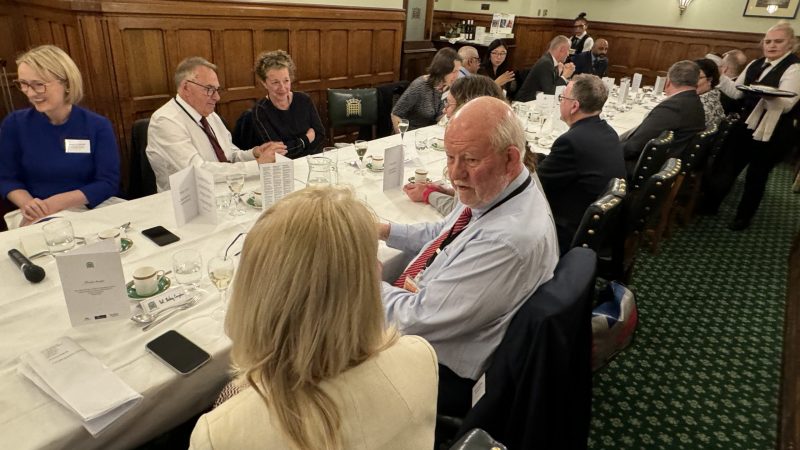The launch of Civic Partners in Net Zero at the House of Commons, 23 April 2024
From self-charging HGVs to energy from biowaste – Key Cities universities propose new ways to tackle climate change
New studies highlight local collaboration to meet sustainability targets
The Key Cities Innovation Network – a group of universities associated with the cross-party network of 27 Key Cities across England and Wales that represents more than 10% of the UK population – has today published “Civic Partners in Net Zero”, a collection of peer-reviewed studies detailing innovative ways in which universities are working with their local places to achieve net zero targets.
The studies – which have been selected not only for local relevance but also their potential for replicating in other places – range from tech innovation and policy development to engaging local communities with climate science.
Local action on climate change was flagged as a priority by the 27 Key Cities last year, when they commissioned the “Levelling Up, Emissions Down” study by Metro Dynamics and Opergy, including a data dashboard tracking the performance of local authorities across a range of climate indicators [published May 2023]. Echoing the conclusions of that study, today’s report notes that local partnership is even more important when there is uncertainty around the national route to net zero. Averting the climate emergency, it says, requires a stable and realistic framework to stimulate meaningful partnerships, supported with funding mechanisms to deliver scalable innovation across all sectors and regions.
The six featured innovations are:
- Dynacov: pioneering new technology to enable recharging of electric vehicles (notably heavy goods and public service vehicles which will still be required in car-free cities) by dynamic recharging while driving on power-enabled public roads. (Coventry University and Coventry City Council)
- The Morecambe Bay Curriculum: climate scientists and researchers working with educators in schools and colleges to weave sustainability and place into everyday teaching across all phases of education, in a collaboration inspired by the development of Eden Project Morecambe. (Lancaster University with Lancaster and Morecambe College)
- Connecting policy and science for net zero carbon construction: trialling local planning policies to achieve low carbon outcomes that go far beyond national building regulations. (University of Bath and Bath & North East Somerset Council)
- Ecological Citizens and Large Housing Estates of the Future: empowering communities and local industry to drive the net zero transition. (Wrexham University with ClwydAlyn Housing Association and local partners)
- The promise of biotech: supporting a circular economy by deploying new technologies to recover waste and produce clean energy and fertilisers. (University of South Wales)
- Stories in the Dust: researchers and a theatre company combine to engage primary school audiences emotionally with climate science. (University of Southampton and Stories in the Dust Theatre Company)
Cllr John Merry, Chair of Key Cities and Deputy Mayor of Salford City Council, said:
“The ideas presented here are important and exciting. Important because what happens in our cities – in construction, in transport, in waste processing, in energy consumption – has a major impact in how we deliver sustainability as a nation, and we in the Key Cities are determined to play our part. Exciting because they demonstrate the ingenuity in our universities and the strength of our growing civic partnership across the network. These are ideas we can build on, both as a network and in partnership with our communities, stakeholders and the government.”
Professor Maria Hinfelaar, Vice-Chancellor of Wrexham University and co-editor of the Civic Partners in Net Zero report, added:
“One of the defining opportunities for the Key Cities Innovation Network is to develop and apply ideas that can scale not only to large cities but to all kinds of urban areas – and their associated rural and coastal places – as represented by the diversity of the Key Cities. When it comes to climate change, universities have a critical role to play in brokering partnerships with their local authorities, community organisations and local people to create a more environmentally sustainable society. While each study in this collection represents a specific locality with its own characteristics and actors, there is scope for replicating the ideas and practices elsewhere and so add value to our collective efforts to reduce carbon emissions locally, nationally and globally.”



